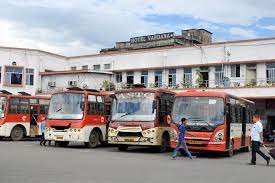HT Digital
Friday, October 18: The Assam State Transport Corporation (ASTC) has been grappling with significant financial losses over the past seven years, averaging an annual deficit of over Rs. 86 crore since the fiscal year 2016–17. This financial strain has been attributed to a variety of factors, including rising repair costs and operational inefficiencies, which have plagued the corporation. In terms of expenditure, ASTC has been spending over Rs. 200 crore annually, particularly due to the increasing price of parts needed for bus repairs and upkeep.
During the fiscal year 2019–2020, ASTC reported a loss of Rs. 82.63 crore, which further escalated to Rs. 97.86 crore in 2020–2021. The situation worsened in the following year, with ASTC suffering its highest loss in recent history, exceeding Rs. 106 crore in 2021–2022. Although the fiscal year 2022–2023 saw a slight improvement, with a reduction of 20% in the overall deficit, the corporation’s financial challenges remain substantial.
Currently, ASTC operates a fleet of approximately 640 buses on various routes across Assam. However, around 226 buses have been leased out through open tenders, and more than 480 buses are currently not operational. This non-operational fleet has added to the financial strain of the corporation. Despite this, ASTC continues to bear the burden of monthly employee salaries amounting to Rs. 4.4 crore for its 1,803 workers. In recent years, 170 employees took voluntary retirement in 2023, and an additional 83 opted for the same this year, as part of efforts to streamline the workforce.
ASTC offers various passenger amenities, including discounted fares for elderly passengers and children, but public sentiment around the state of the buses remains negative. A frequent passenger remarked on the poor condition of the buses, stating that apart from the newly introduced green buses, the regular buses are in dire condition. He noted that many passengers now avoid these buses, and that services often cease after 8:00 p.m., leaving commuters with limited options.
The condition of the fleet has also been a point of contention among ASTC employees. One employee expressed frustration over the lack of air conditioning in long-distance buses, explaining that the hot summer months make travel extremely uncomfortable. He suggested that ASTC should improve the quality of services by equipping buses with air conditioning and conducting regular maintenance. The employee emphasized that only the buses leased out to private operators are in decent shape, while the others continue to deteriorate.
A contractual driver with ASTC echoed similar concerns, pointing out that over a thousand casual workers have been employed by the department for nearly a decade without seeing any pay increases. He expressed dissatisfaction with the management’s practice of transferring workers to remote locations when they raise concerns about wages. These casual workers have been demanding permanent positions within the corporation for years, but their requests have gone unheard.
The driver also criticized the department for its failure to maintain the buses properly. He said that drivers are willing to perform their duties, but the lack of adequate vehicle servicing has made their jobs more difficult. According to the driver, ASTC often claims it lacks the funds to repair the buses, resulting in frequent breakdowns and poor overall service. Furthermore, the green buses introduced by ASTC, which are automated, have faced numerous accidents. The employee believes this is due to the lack of training provided to drivers on how to operate the automated buses effectively, and he voiced concerns that these green buses are also falling into disrepair due to negligence.
Despite these challenges, ASTC remains a vital part of Assam’s public transportation system. However, the corporation faces an uphill battle to recover from its financial losses, improve bus maintenance, and address employee grievances. The growing frustration among both employees and passengers highlights the urgent need for reforms to ensure ASTC’s sustainability and efficiency in the years to come.












